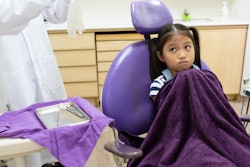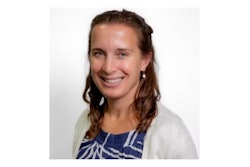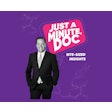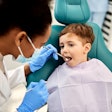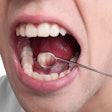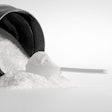The ADA's code of ethics outlines the principle of nonmaleficence -- “Do no harm” -- as one of dentistry’s most fundamental ethical guideposts. It charges dental professionals with the responsibility to protect patients from harm by maintaining competency, understanding the limits of one’s expertise, and delegating care only to qualified personnel.
Yet today, in response to a nationwide workforce shortage, a growing number of proposals suggest replacing licensed dental hygienists with individuals trained solely to “scale teeth” through on-the-job programs. This stopgap “solution” raises serious concerns about patient safety, clinical integrity, and ethical accountability. When expertise is treated as optional, comprehensive care becomes fragmented, and it is our patients who suffer the most are our patients.
More than just scaling: What’s being left behind?
 Kelly Tanner, PhD, RDH.
Kelly Tanner, PhD, RDH.
If the intent is to replace licensed hygienists with individuals trained only to “scale teeth” on the job, then we must ask who is responsible for the rest of the patient’s care?
Dental hygiene is not solely about removing calculus. As a hygiene educator with nearly three decades of experience in dental hygiene and dental school settings, I can attest that the depth of training required for comprehensive care in dental hygiene education extends far beyond what many realize.
In fact, the scaling portion of a preventive appointment often takes only five to 20 minutes for a healthy periodontium. The remaining time is spent addressing the critical aspects of whole-person care, such as reviewing the patient's medical history, assessing their periodontal health, staging and grading disease, treatment planning, and educating patients on oral-systemic connections.
Hygienists are also trained in caries risk assessment, nutritional counseling, tobacco and vaping cessation, microbiome testing, pH evaluation, oral cancer screening, and airway assessment. These are not optional extras -- they are essential services that help patients prevent disease, manage chronic conditions, and improve quality of life.
If hygienists are reduced to “tooth cleaners,” then who will advocate for patients to receive these services? And more importantly, who will even recognize that the services are missing?
Limited preparation, big responsibility: Who’s training the trainers?
As proposals emerge to train individuals to “scale teeth” on the job, a key concern is who exactly is doing that training? In many cases, the responsibility may fall to dentists, well-intentioned professionals, who likely do not have the depth of education in instrumentation that dental hygienists possess.
Even in dental school, instrumentation is not the primary focus. Having taught dental students and periodontal residents in both academic and clinical settings, I've observed firsthand the limited emphasis placed on scaling proficiency within dental programs.
Most dental students receive a limited amount of clinical time dedicated to mastering scaling techniques. That’s not a criticism -- it’s a reality of a curriculum built around broader diagnostic and restorative training.
However, it raises questions when those same individuals are expected to teach others how to perform delicate, technique-sensitive procedures without the extensive hands-on preparation that hygienists receive.
Root morphology, furcation navigation, endpoint debridement, and tissue response -- these are not skills that can be passed down quickly or casually.
When the foundation of care is compromised, patient safety is at risk, and the public’s trust in our profession erodes. This is more than a clinical concern, it’s an ethical one.
According to the ADA’s principle of “nonmaleficence,” dentists must ensure that care is delegated only to properly trained and licensed individuals. Replacing hygienists with minimally trained personnel undercuts this principle and places patients in potentially harmful situations.
Unspoken divide: Should dental hygiene become its own profession?
More and more, dental hygiene is being viewed as a technical function rather than a profession rooted in science, education, and patient-centered care. When professional organizations fail to protect the role of the hygienist, or when decision-makers design policy without our voice at the table, it sends a clear message: Our value is negotiable.
If dentistry no longer wants hygiene to be a collaborative partner in care, then perhaps it’s time to consider what independence could look like. Medicine and dentistry were once separated into distinct professions, and maybe dental hygiene deserves the same clarity of identity.
Hygienists have fought for decades to practice at the top of their license. As someone who has advocated on behalf of the profession and has served as both a dental hygiene program director and clinical coordinator, I’ve witnessed the resilience and passion hygienists bring to elevating their role in patient care, crossing state lines, serving underserved communities, and delivering preventive care that changes lives. And yet, barriers remain, not because of patient need or clinical evidence but because of politics and power.
Patient trust starts with transparency
Patients don’t just walk into a dental office for a “cleaning.” They come because they trust their dentist to do what is best for them. They believe they are receiving care from licensed, qualified professionals. However, when someone with minimal training steps in to replace a licensed hygienist, that trust is silently betrayed.
Can we really say we uphold the ADA’s principle of veracity if patients are not told who is performing their care? Are we honoring patient autonomy if they are not given a clear choice?
Delegating critical care to undertrained individuals without disclosure isn't just ethically questionable, it borders on misrepresentation. And if patients knew what care they were opting out of by seeing an unlicensed professional, would they consent?
Uphold ethics. Protect patients. Respect the profession.
Replacing hygienists to cobble together workforce gaps doesn’t solve the problem, it creates new ones. Not only does it put patients at risk, but it opens the door to significant liability for providers who cross legal and ethical lines.
If we are to honor the ADA’s principle of nonmaleficence, we must stop treating expertise as expendable and invest in growing the hygiene workforce, not shortcutting it.
Dental leaders, please consider including dental hygienists in the conversations that shape policy, education, and care delivery. Drawing from my years of experience training future providers, the absence of dental hygienists at decision-making tables undermines both care quality and workforce development, because the integrity of patient care depends on the integrity of the team providing it.
When expertise is ignored, patients pay the price. And because … "above all, we must do no harm.”
Kelly Tanner, PhD, RDH, is a contributing author to DrBicuspid, where she shares insights and strategies to empower dental hygienists in their careers. As a leader in clinical training, professional development, and team dynamics, Tanner provides resources to help hygienists elevate their practice and personal growth. For further support, join her free Facebook group, Next Level Dental Hygiene Career and Personal Development, and explore group training and on-demand courses at www.nextleveldentalhygiene.com.
The comments and observations expressed herein do not necessarily reflect the opinions of DrBicuspid.com, nor should they be construed as an endorsement or admonishment of any particular idea, vendor, or organization.






